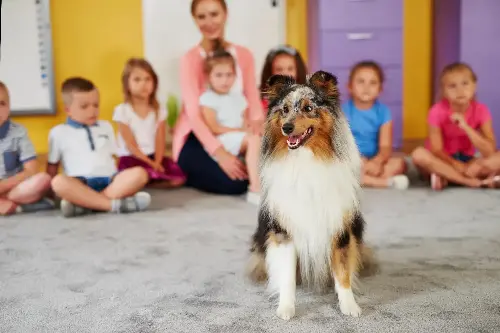The Shetland Sheepdog, often affectionately referred to as the Sheltie, is a breed that has captured the hearts of dog lovers worldwide. Not only are they striking with their luscious coat and sharp, intelligent eyes, but they are also incredibly attuned to human emotions, which makes them exceptional family companions.

Shelties, originally bred for herding on the Shetland Islands, are highly sensitive dogs that thrive on human companionship. Their emotional depth is one of their most notable traits. This sensitivity makes them excellent at reading their owner’s moods and intentions, often acting accordingly to comfort, play, or provide support.
The Root of Sensitivity in Shelties
The sensitivity of Shetland Sheepdogs stems from their herding heritage. Herding breeds needed to be responsive and attentive to both the commands of their shepherd and the needs of the flock. This requirement has endowed Shelties with an innate ability to pick up on subtle cues and changes in their environment, including human emotions.
This breed's intelligence is not only cognitive but also emotional. They often react to their owner's tone of voice, body language, and overall demeanor. This ability to "read the room" makes them highly attuned companions who offer a unique form of empathy that is not found in all dog breeds.
Shelties in the Family
Within a family setting, Shelties shine as they form strong bonds with each member, often becoming particularly attached to one person whom they seem to choose as their primary companion. Their emotional connection with humans means they are excellent with children, often becoming gentle protectors and playmates. They are understanding and patient but will also alert the family to any perceived threats or unusual activity, making them good watchdogs due to their vigilant nature.

The downside to their sensitive nature is that they can easily become anxious or stressed if there is tension or raised voices in the home. A harmonious environment is essential for the well-being of a Sheltie.
Training and Socialisation: Building Confidence
The key to harnessing a Shetland Sheepdog’s intelligence and sensitivity is through consistent, positive reinforcement training. Shelties are eager to please and respond well to training that includes praise and treats. Harsh words or punishment can be very damaging to their sensitive spirits and can lead to issues of timidity or fear.
Early socialisation is crucial in developing a well-rounded Sheltie. Exposure to different people, environments, and situations helps them become more resilient and less prone to anxiety. In particular, socialisation helps temper their natural wariness of strangers, ensuring they become well-adjusted adults.
Shelties and Therapeutic Work
Due to their ability to connect emotionally with humans, Shelties are excellent candidates for therapeutic and assistance work. They are often found in roles as emotional support animals or in therapy dog programs where their empathy can be put to good use assisting individuals with various emotional or physical issues. The presence of a Sheltie can have a calming effect, especially in environments such as hospitals, nursing homes, or schools.

Their involvement in such roles not only benefits the recipients but also provides the Shelties with a sense of purpose and fulfillment. This work allows them to exercise their emotional capabilities and to thrive on the connection they form with those they help.
The Right Home for a Sheltie
Shelties thrive in environments where they feel loved and included as part of daily activities. They do not do well when left alone for long periods or neglected, as this can lead to destructive behaviours or depression. A home with a securely fenced yard is ideal, as their herding instinct may get the better of them if they see something they perceive as needing to be corralled or chased.
When considering bringing a Sheltie into your life, it is essential to ensure you have the time and patience to meet their emotional needs. In return, they will offer unwavering loyalty, affection, and an intuitive companionship that is deeply rewarding.
In conclusion, the Shetland Sheepdog is a breed whose emotional depth transcends merely being a pet; they are companions of the heart. Their keen sensitivity and intelligence, coupled with their undying loyalty, make them one of the most loving and attentive breeds one could hope to have as part of the family. For those fortunate enough to experience life alongside a Sheltie, it becomes clear that these dogs truly understand the language of human emotion, making every moment with them profoundly special.
